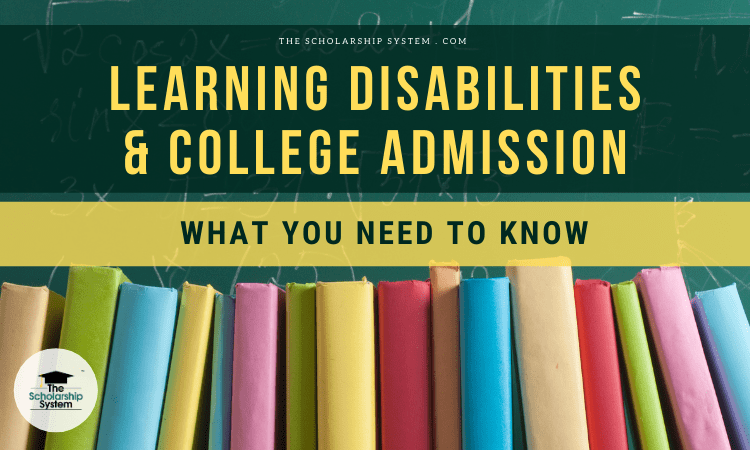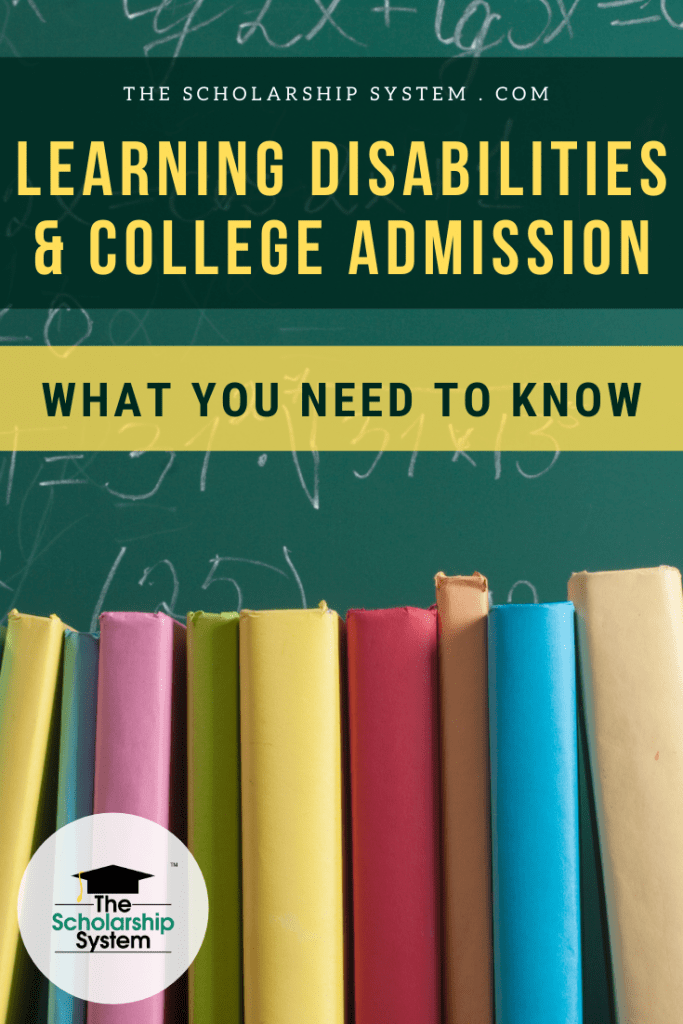Updated on December 11th, 2024
Overall, one in five students has attention or learning disabilities. Despite those challenges, many of those students can thrive in college. Many students with learning disabilities overcome challenges to graduate high school and pursue higher education, demonstrating determination and leveraging available resources.
Learning disabilities and college success can certainly go hand-in-hand. Not only may students have access to learning disability college scholarships, reducing the financial burden associated with earning a degree, but they also have access to helpful programs designed to help them succeed.
Yes, it’s true. There are scholarships specifically for students with learning disabilities. If you and your student want to learn more about these (and other) scholarship opportunities, sign up for our free college scholarship webinar! Take a trip over to http://thescholarshipsystem.com/freewebinar to reserve your spot today.
If your student has a learning disability, knowing what resources may be available to them is crucial. That way, they can take advantage of the various programs that are there to help them excel, increasing the odds that they will thrive in their classes and graduate on time.
Additionally, it is wise to focus your student’s college search on schools that can meet their special needs. While a student with learning disabilities could potentially soar at any college, some are better equipped to assist them than others.
Here’s everything you need to know about approaching learning disabilities and college decisions.
Contents
LEARNING DISABILITIES AND COLLEGE ADMISSION
When students begin to explore their college options, they can feel overwhelmed and may worry that their learning disability will harm their chance to get into a choice school. If your student is concerned about how their learning disabilities affect their college applications and the college admissions process, including their likelihood of being accepted.
DO LEARNING DISABILITIES IMPACT COLLEGE ADMISSIONS?
Learning disabilities can impact college admissions, but likely not in the way your student is concerned about.
First and foremost, colleges are barred from discriminating against students with disabilities of any kind, including learning disabilities. That means no student can be turned away from higher education solely because of their learning disability diagnosis. Under the Americans with Disabilities Act, colleges are required to provide accommodations for students with disabilities, ensuring they have equal access to education.
Instead, colleges have to examine everything a student brings to the table. Usually, this includes grades on high school transcripts, standardized test scores, volunteer work, extracurricular activities, essays, and more.
It may seem that a learning disability could work against a student when they apply to college, particularly if it led them to struggle a bit in high school. That isn’t always the case. When a student has a learning disability, some admissions departments will review the standard application information in a new light. A diagnosis gives context to the grades, test scores, and class ranking.
Additionally, when a student has a learning disability, it often means that they faced a significant challenge head-on. Some colleges and admissions committees find that admirable, particularly if a student discusses their journey and self-determination in a well-written essay. Proper documentation for a student’s learning disability, such as transitioning from an IEP to a 504 plan, is crucial for accessing accommodations and support in college.
Should You Hide or Highlight a Learning Disability on Your College Application?
At times, students and their parents may assume that hiding the student’s learning disability is the best move. However, as we mentioned above, discussing it openly can work in a student’s favor.
According to data collected by NCES, a significant percentage of college students reported having a disability, highlighting the importance of understanding the impact of disclosure.
When your student talks about their life skills and journey to higher education and provides information outlining the nature of their learning disability, it may make them a more attractive candidate. It gives the admission committee critical context about your student’s high school experience and study skills, helps them stand out from other applicants, and increases their odds of getting the support they need to excel.
In some cases, being open about a learning disability could boost their chances of receiving certain kinds of financial aid. Some schools offer institutional scholarships to students with disabilities, for example. Additionally, some colleges have mentorship programs where graduate students assist undergraduates with learning disabilities.
This doesn’t mean that only talking about their learning disability is one of the best writing strategies when they create any required essays. While it can certainly be the focus of one, it’s usually wise to discuss different topics with others. This makes your student appear more well-rounded to the admissions committee, which often works in their favor.
How Should Students with Learning Disabilities Choose a College?
As with all college searches, students should spend a little time determining what they want from their college experience. What kind of degree do they want to earn? Are particular states or cities a preferred destination? What sort of college culture is the best fit? How much can they cover cost-wise with financial aid and savings?
Ultimately, all students need to select colleges that let them move toward their desired careers and offer an experience conducive to learning, personal growth, and academic success. This includes students with learning disabilities.
However, when choosing a college, students with learning disabilities also need to explore the accommodations provided by the school and support programs. Not all schools are created equal in this department. Some will have more resources or may have more experience than others, which is why students need to explore what’s actually available to them. Some colleges have mentorship programs where graduate students provide additional support and guidance to students with learning disabilities.
Information about accommodations and support programs is usually fairly accessible. At times, it’s listed online. However, students may also need to contact the college’s disability services office for details about providing extra support and accommodations.
Myths About Learning Disabilities and College Admissions
Students Should Stop Their IEP or 504 Plan Before Applying to College
One of the more persistent myths about college admission for students with learning disabilities is that having an Individualized Education Program (IEP) or 504 plan harms their chances. In reality, this isn’t the case. Colleges aren’t allowed to ask about a student’s disability, and they can’t discriminate against students with an IEP or 504 plan.
Additionally, student transcripts won’t mention the presence of an IEP or 504 plan ( though there can be signs if a modified curriculum is involved). Similarly, school counselors, school administrators, involved learning specialists, and other employees can’t discuss the use of those programs without a student’s permission.
Further, even if the information is disclosed to the school either by the student or with the student’s consent, that doesn’t mean the college views it negatively. Generally, that means there’s no need to stop these plans prior to students applying to college.
Students Should Disclose Disabilities Since Colleges Have Related Admissions Quotas to meet.
While many students assume that colleges have specific quotas relating to students with disabilities, this is a myth. Schools aren’t required to admit a particular number of students with disabilities, so disclosing one doesn’t put a student into a special applicant group that would increase their odds of admission.
Disclosing a Disability Requires Colleges To Apply Different Admissions Standards
If a student doesn’t meet the traditional admissions requirements for a college, they may believe that disclosing a disability means the school must apply different criteria. Ultimately, that isn’t the case.
Colleges aren’t required to adjust their requirements due to a student’s disability. However, schools can choose to admit a student who doesn’t meet its conventional admissions criteria. Whether a college does so is solely at its discretion, so disclosing a disability may or may not cause the school to make any adjustments.
Students with Learning Disabilities Should Always Disclose a Disability to Gain an Advantage Due to Diversity Initiatives
Many colleges do have diversity initiatives, but whether disclosing a disability works in a student’s favor is unclear. Ultimately, students shouldn’t decide to disclose a disability solely to gain a competitive advantage based on diversity initiatives, particularly if it would make them uncomfortable, as there is no guarantee that doing so gives them a leg up during the admissions process.
Getting Rejected After Disclosing a Learning Disability Means Discrimination Occurred
Colleges are barred from factoring in a student’s disability when making admissions decisions. As a result, disclosing a learning disability on college applications can’t legally be used as a reason to deny admission to a student. Additionally, there’s no data that supports widespread issues of discrimination related to students with learning disabilities.
What students need to remember is that college admission processes involve an array of factors. Schools can only support so many students, both overall and in specific departments. As a result, many schools – particularly top colleges with far more applicants than they can reasonably admit – have to reject numerous students every year. That means qualified students of all kinds – including those with or without learning disabilities – may not gain entry to several colleges.
Assistance and Accommodations for College Students with Learning Disabilities
If your student has a learning disability and college is on the horizon, they may be wondering what kind of support, accommodations, and student services they can expect to attend college with. Colleges and universities offer various support services aimed at assisting students with learning disabilities, enhancing their academic experience. Here’s a look at the types of assistance and accommodations for college students with learning disabilities they may find, as well as what may not be available.
ARE THERE IEP OR 504 PLANS IN COLLEGE?
Students with learning disabilities often have access to Individualized Education Programs (IEP) or 504 Plan programs in high school. However, those programs don’t exist for students at the college level.
Even with that being the case, it doesn’t mean students are left out in the cold. Instead, they will have access to accommodations designed to help them thrive.
ARE STUDENTS WITH LEARNING DISABILITIES IN COLLEGE PROTECTED BY SECTION 504?
While 504 education plans aren’t available once a student leaves high school, students with learning disabilities are still protected by Section 504 of the Rehabilitation Act of 1973. Schools must offer eligible students reasonable accommodations for their disability and cannot discriminate against students with disabilities.
WHERE DO STUDENTS FIND OUT ABOUT AVAILABLE LEARNING DISABILITY COLLEGE ASSISTANCE?
If your student is looking for an overview of what’s available, they may find the details online. Some schools have a dedicated webpage for the disability services the admissions office has, which may provide an overview of disability information and what the college offers.
However, if your student wants a highly detailed look or a personalized plan, their best bet is to contact the disability services office directly. That way, your student can present their unique situation and get the exact answers they need.
What Are the Accommodations for College Students with Learning Disabilities?
College students with learning disabilities commonly have access to various forms of assistance – including accommodations – through their school. Precisely what’s available will vary. However, certain offerings are fairly common at most colleges.
For example, many students who are going to college with a learning disability can have access to:
- Extended assignment deadlines
- Extended time for tests
- Private exam rooms for tests
- Note-taking support
- Audio recording options for lectures, textbooks, etc.
- Tutoring services (including peer tutoring)
- School counselors
- Study guides and study skills development support
- Expanded feedback on assignments
- Course substitutions
- Assistive technology
- Stress management assistance
- And more
Precisely what is made available to a student depends on the exact nature of their learning disability. Additionally, options not listed above may be on the table, which is why it’s so crucial for student self-advocacy to reach out to each college they are considering to find out what’s available.
Yes, it’s true. There are scholarships specifically for students with learning disabilities. If you and your student want to learn more about these (and other) scholarship opportunities, sign up for our free college scholarship webinar! Take a trip over to http://thescholarshipsystem.com/freewebinar to reserve your spot today.








Leave a Reply